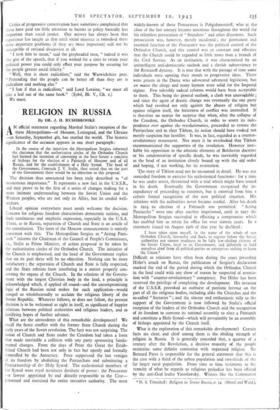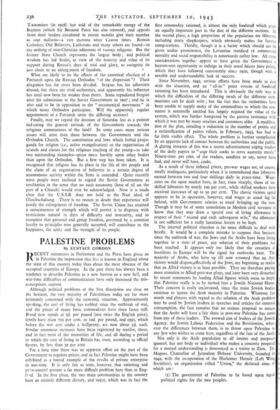RELIGION IN RUSSIA
By DR. J. H. RUSHBROOKE
In the course of the interview the Metropolitan Sergius informed the chairman that the authoritative circles of the Orthodox Church had formed the intention of convening in the hear future'a conclave of bishops for the election of a Patriarch of Moscow and of all Russia, and for the establishment of a Holy Synod. The head of the Government, Comrade J. V. Stalin, then stated that on the part of the Government there would be no objection to this proposal.
The decision thus announced has been truly described as " of momentous importance." It represents a new fact in the U.S.S.R, and may prove to be the first of a series of changes making for a more intimate understanding between the Soviet Union and the Western peoples, who are not only its Allies, but its cordial well- wishers.
Liberal opinion everywhere must needs welcome the decision. Concern for religious freedom characterises democratic nations, and finds continuous and emphatic expression, especially in the U.S.A. There, as in Russia, separation of Church and State is an article of the constitution. The form of the Moscow announcement is entirely consistent with this. The Metropolitan Sergius as " Acting Patri- arch " informs the Chairman of the Council of People's Commissars, i.e., Stalin as Prime Minister, of action proposed to be taken by the authoritative circles of the Orthodox Church. The initiative of the Church is emphasised, and the head of the Government replies that on its part there will be no objection. Nothing can be more satisfactory ; the separation of Church and State is fully respected, and the State refrains from interfering in a matter properly con- cerning the organs of the Church. In the relations of the Govern- ment with the largest Christian body in the land, a principle is acknowledged which, if applied all round—and the uncompromising logic of the Russian mind makes for such application—would compel us wholeheartedly to acclaim the religious liberty of the Soviet Republic. Whatever follows, or does not follow, the present decision is to be welcomed as right in itself, as significant of happier relations between political authorities and religious leaders, and as justifying hopes of further advance.
What are the antecedents of this remarkable development? We recall the fierce conflict with the former State Church during the early years of the Soviet revolution. The fur' was not surprising. The union of Church and State under the Czardom had taken a form that made inevitable a collision with any party sponsoring funda- mental changes. From the days of Peter the Great the Estab- lished Church had been not only in fact but openly and formally controlled by the Autocracy. Peter suppressed the last vestiges
of its freedom by abolishing the Patriarchate and substituting a Procuratorship of the Holy Synod. The ecclesiastical members of
tie Synod were royal nominees destitute of power: the Procurator --a lawyer appointed by and directly responsible to the Czar— possessed and exercised the entire executive -authority. The most widely-known of these Procurators is Pobkdonostzeff, who at the close of the last century became notorious throughout the world for his relentless persecution of " Stundists " and other dissenters. Such • persecution was, however, merely incidental ; the permanent and essential function of the Procurator was the political control of the Orthodox Church, and this control was so constant and effective that the Church could be regarded as little more than a branch of the Civil Service. As an institution, it was characterised by an unintelligent anti-democratic outlook and a slavish subservience to the Romanoff dynasty. It is true that with the passage of time some individuals were opening their minds to progressive ideas. There were priests in the Duma who advocated advanced legislation, but
en masse the clergy and many laymen were solid for the Imperial regime. Few tolerably radical reforms would have been acceptable to them. This being the gneral outlook, a clash was unavoidable ;
and since the agent of drastic change was eventually the one party which had revolted not only against the abuses of religion but against religion itself, the bitterness of conflict was intensified. It is therefore no matter for surprise that when, after the collapse of
the Czardom, the Orthodox Church, in order to assert its inde- pendence over against the revolutionaries, proceeded to restore the Patriarchate and to elect Tikhon, its action should have evoked not
merely suspicion but hostility. It was, in fact, regarded as a counter- revolutionary manoeuvre. Nor must it be overlooked that Tikhon excommunicated the supporters of the revolution. However justi- fiable his opposition to the atheistic elements of Bolshevist doctrine or his condemnation of specific deeds, he was inevitably regarded as the head of an institution closely bound up with the old order and hoping, if not working, for its restoration.
The story of Tikhon need not be recounted in detail. He was not conceded freedom to exercise his ecclesiastical functions: for a time he was under arrest, threatened with a trial which might have issued in his death. Eventually the Government recognised the in- expediency of proceeding to extremes, but it extorted from him 3 ceftain formal recognition of the new political situation. His relations with the authorities never became cordial. After his death in 1924 no election of a Patriarch was permitted. " Acting Patriarchs " were one after another imprisoned, until in 1927 the Metropolitan Sergius succeeded in effecting a compromise which has enabled him to retain his office for over sixteen years. In a statement issued on August 19th of that year he declared :
I have taken upon myself, in the name of the whole of our Orthodox Church, hierarchy and flock, to register before the Soviet authorities our sincere readiness to be fully law-abiding citizens of the Soviet Union, loyal to its Government, and definitely to hold ourselves aloof from all political parties or enterprises seeking to harm the Union.* Difficult as relations have often been during the years preceding Hitler's attack on Russia, the publication of Sergius's declaration marked the end of the period during which the Orthodox Church in the land could with any show of reason be suspected of associa- tion with " counter-revolutionary " conspiracy. For Hitler has been reserved the privilege of completing the development. His invasion of the U.S.S.R. provoked an outburst of patriotic fervour on the part of all the religious bodies, including alike the Churches and the
so-called " Sectaries "; and the sincere and enthusiastic rally to the support of the Government is now followed -by Stalin's official reception of the leaders of the Orthodox Church and the recognition of its freedom to convene its national assembly to elect a Patriarch and constitute a Holy Synod—which will presumably be an assembly of bishops appointed by the Church itself.
What is the explanation of this remarkable development? Certain facts are clear, and chief among them is the abiding strength of religion in Russia. It is generally conceded that, a quarter of a century after the Revolution, a decisive majority of the people maintains some definite connexion with organised religion. Sir Bernard Pares is responsible for the general statement that this is the case with a third of the urban population and two-thirds of the far larger rural population. From time to time testimony to the tenacity of what he regards as religious prejudice has been offered by the anti-God leader Yaroslawsky. Writers like the Communist * N. S. Timasheff: Religion in Soviet Russia, p. 34. (Sheed and Ward.). Tothomfrov (in 1928) hay told of the remarkable energy of the Baptists (which Sir Bernard Pares has also stressed), and appeals from their leaders circulated in recent months give their number
as lour millions—a vast increase. smce Czarist times. Roman Catholics, Old Believers, Lutherans and many others are found—to
say nothing of non-Christian adherents of various religions. But the former State Church represents the largest body ; and political wisdom has led Stalin, in view of the honesty and value of its support during Russia's days of trial and glory, to recognise its just claim to an enlargement of freedom. • What are likely to be the effects of the canonical election of a Patriarch upon the Russian Orthodox " of the dispersion "? Their allegiance has for years been divided. Sergius. has his adherents abroad, but there are rival authorities, and apparently his influence has until now been far weaker than theirs. Some repudiated Sergius after his submission to the Soviet Government in 1927 ; and he is also said to be in opposition to the " oecumenical movement " in which many Orthodox participate. Will the apparently regular appointment of a Patriarch unite the differing sections?
• Finally, may we regard the decision of Saturday last as a pointer indicating the general attitude of the Government towards the religious communions of the land? In some cases more serious issues will arise than those between the Government and the Orthodox Church. The constitution and laws which forbid propa- ganda for religion (i.e., active evangelisation) or the organisation of schools and classes for the religious teaching of the young—to take two outstanding examples—press more harshly upon other bodies than upon the Orthodox. But a first step has been taken. It is recognised that religion has its place in the life of the people and the claim of an organisation of believers to a certain degree of autonomous activity within the State is conceded. Quite recently most people were inclined to regard the Soviet Government as totalitarian in the sense that no such autonomy (least of all on the part of a Church) would ever be acknowledged. Now it is made clear that the U.S.S.R. does not hold to the Nazi ideal. of Gleichschaltung. There is no reason to doubt that experience will justify the enlargement of freedom. The Soviet Union has attained a consciousness of strength which will permit it to dispense with restrictions natural in days of difficulty and insecurity, and to recognise that personal and group freedom, governed by a common loyalty to principles now generally accepted, will contribute to the happiness, the unity and the strength of its people.



























 Previous page
Previous page